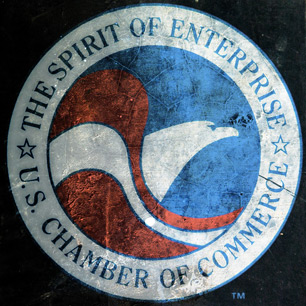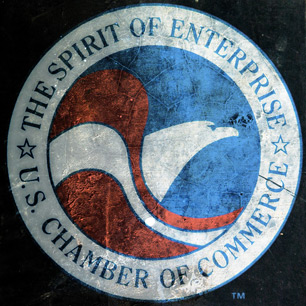 (Photo: Timothy Valentine / Flickr, Edited:Lance Page / Truthout)In a new lawsuit against the Securities and Exchange Commission (SEC), big energy extractors are pushing for carte blanche in their interactions with foreign governments, making it harder to track whether their deals are padding the coffers of dictators, warlords, or crony capitalists. The United States Chamber of Commerce, American Petroleum Institute, the Independent Petroleum Association of America, and the National Foreign Trade Council filed a lawsuit on October 10, 2012 against a new SEC rule, which requires U.S. oil, mining and gas companies to formally disclose payments made to foreign governments as part of their annual SEC reporting.
(Photo: Timothy Valentine / Flickr, Edited:Lance Page / Truthout)In a new lawsuit against the Securities and Exchange Commission (SEC), big energy extractors are pushing for carte blanche in their interactions with foreign governments, making it harder to track whether their deals are padding the coffers of dictators, warlords, or crony capitalists. The United States Chamber of Commerce, American Petroleum Institute, the Independent Petroleum Association of America, and the National Foreign Trade Council filed a lawsuit on October 10, 2012 against a new SEC rule, which requires U.S. oil, mining and gas companies to formally disclose payments made to foreign governments as part of their annual SEC reporting.
This lawsuit is not the only effort underway to make it easier for American corporations working overseas to bribe corrupt government officials. The U.S. Chamber of Commerce is also pushing for a radical rollback of a 35 year old anti-bribery statute that has been tripping up U.S. companies abroad.
New SEC Rule Forces Disclosure of Financial Transactions With Foreign Governments
The challenged SEC provision, which aims to bring transparency to U.S. corporate payments to foreign governments abroad in an effort to combat bribery and corruption, was required by Congress in a last minute addition to the 2010 Dodd-Frank Wall Street reform bill. Some parts of Dodd-Frank have gone into effect while others are still under assault by industry in the lengthy rule-making processes. Senators Dick Lugar (R-Indiana) and Ben Cardin (D-Maryland) authored the provision, which simply requires U.S. corporations to report in their annual SEC filing any payments made to foreign governments.
This legislation is a crucial step in increasing transparency and accountability in countries with a history of government corruption. In many countries, there are often huge discrepancies between what companies might say that they paid the government and what the government said it received. Formal disclosure can serve as a critical tool for activists and citizens fighting corruption and poverty, which is why the measure was backed by groups like Oxfam International and Bono’s ONE campaign.
“The Cardin-Lugar Amendment puts transparency — the key to citizens’ ability to hold their government to account — ahead of corruption. To do otherwise is a losing proposition for the United States and company shareholders,” Lugar said in a statement this week. The SEC worked on the rule for two years with abundant business input.
Lawsuit Alleges Rule too Costly, Violates Corporate Rights
The groups which filed the lawsuit allege that the SEC failed to take into account the rule’s costs and benefits and that it “grossly misinterpreted its statutory mandate” in crafting the rule and has violated corporate “First Amendment” rights.
For supporters, it is difficult to see what is so costly about inserting a few paragraphs into an annual SEC filing. “We are greatly disappointed that the oil industry is trying to use the courts to bully the SEC and push for secrecy in their payments to governments,” said Ian Gary of Oxfam. “We call on companies, such as BP, Exxon, Chevron and Shell, who are hiding behind industry associations to do their dirty work while espousing transparency rhetoric, to disassociate themselves from the lawsuit.”
The attorney heading the challenge to the Dodd-Frank anti-bribery rule is Eugene Scalia, son of Supreme Court Justice Antonin Scalia. Of the six challenges that SEC regulations have faced and lost in federal court of appeals in Washington, DC since the mid 2000s, Eugene Scalia was behind four. He won a case on behalf of the U.S. Chamber of Commerce last year on the Dodd-Frank “proxy access rule,” which would have allowed shareholders to play a role in nominating company directors. Scalia also helped win a case in September against the SEC on a rule which would have imposed trading limits on speculators.
U.S. Chamber of Commerce Tries to Gut Foreign Corrupt Practices Act
Efforts to keep bribery under a veil of secrecy go beyond attacks against the SEC transparency rule. The U.S. Chamber of Commerce has also been waging a war against the 1977 Foreign Corrupt Practices Act, which was adopted after a rash of bribery scandals of foreign officials was revealed, involving more than 400 U.S. corporations. The law, introduced by Senator William Proxmire (D-Wisconsin), bans companies from bribing foreign officials in order to secure land and retain business deals, and requires public companies to file financial statements and maintain internal controls. The Department of Justice (DOJ) and SEC are responsible for its enforcement and have been stepping up the pace in recent years, dedicating new staff and resources to a crackdown.
Now, the Chamber is actively pushing five amendments to the 1977 law, which would significantly weaken its enforcement mechanisms.
The value of the law was recently highlighted when The New York Times broke the story this spring that Walmex (Wal-Mart in Mexico), executives allegedly covered up millions of dollars in bribes to Mexican officials in an effort to fuel the company’s expansion in the country. Wal-Mart says it spent some $51 million on an internal investigation looking into whether the subsidiary violated the anti-bribery law and the U.S. Justice Department is also investigating.
According to the Chamber’s tax filings, 14 of the group’s 55 board members between 2007 and 2010 “were affiliated with companies that were reportedly under investigation for violations or had settled allegations that they violated the Foreign Corrupt Practices Act.” Chamber member Pfizer recently paid $60 million to the SEC and DOJ to settle claims that its subsidiaries bribed foreign doctors and pubic officials to gain market access for its products in Eastern Europe.
Major American firms frequently embrace transparency as an alternative to mandatory binding regulation. Now transparency is also taking a beating as U.S. firms fight for the right to bribe foreign governments and hide their activities from American shareholders and the citizens of the nations where they do business.
Join us in defending the truth before it’s too late
The future of independent journalism is uncertain, and the consequences of losing it are too grave to ignore. We have hours left to raise the $12,0000 still needed to ensure Truthout remains safe, strong, and free. Every dollar raised goes directly toward the costs of producing news you can trust.
Please give what you can — because by supporting us with a tax-deductible donation, you’re not just preserving a source of news, you’re helping to safeguard what’s left of our democracy.
